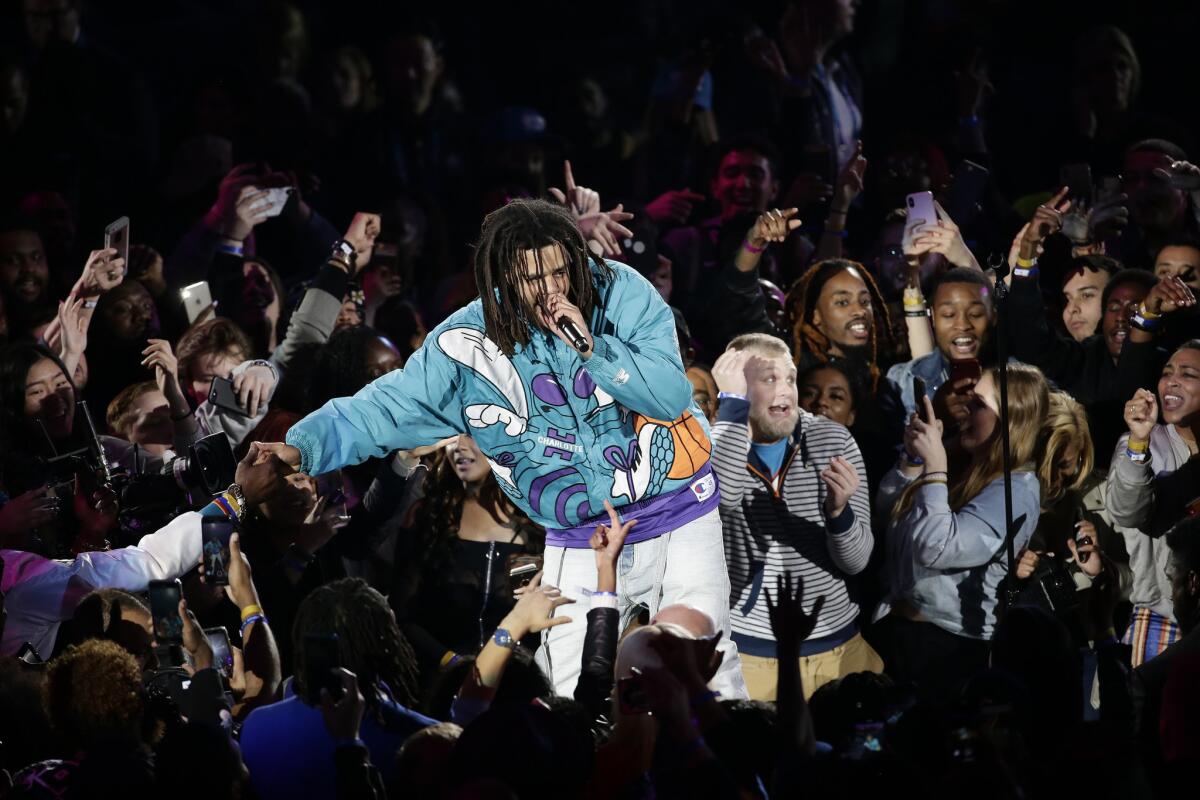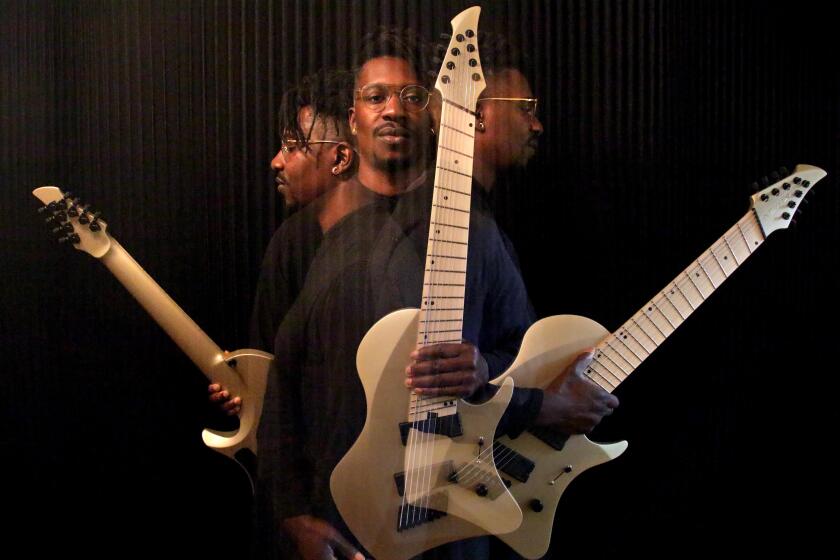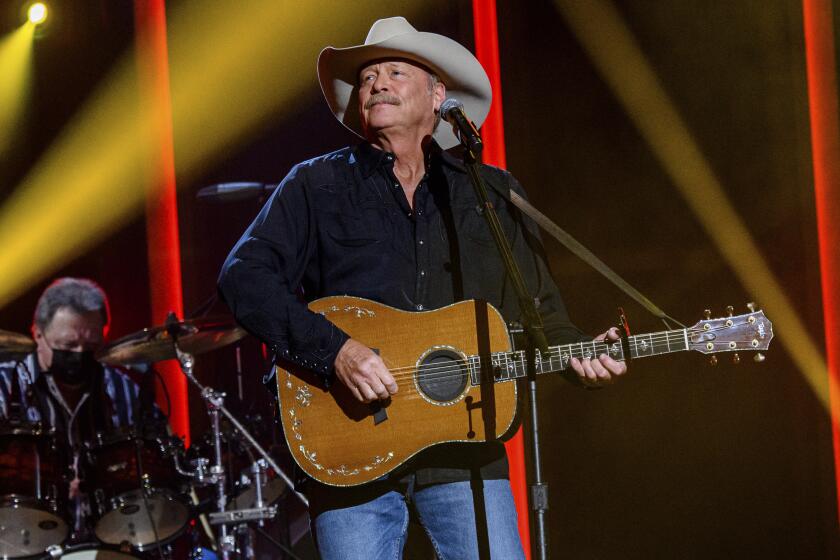J. Cole’s defensive, paternalistic, tin-eared new track falls short of the moment

- Share via
For much of J. Cole’s career, the earnest and principled rapper from North Carolina has portrayed youth as a burden, a liability, a condition to be overcome on the path to experience. Alternately stern and compassionate, he’s counseled younger artists on the perils of fame and scolded them for emphasizing form over content. His approach has attracted plenty of scorn, but it’s also made him one of hip-hop’s most popular acts: a beacon for rap fans, not all of them old, who worry that the music no longer says anything.
It was bewildering, then, to hear Cole, 35, explicitly ask to be viewed as a kid this week in a new song that instantly became a flashpoint in the gathering conversation about rappers’ responsibilities to the Black Lives Matter movement.
Released without warning Tuesday night, “Snow on tha Bluff” finds Cole pondering the extent of his involvement over a pensive, guitar-based backing track. Six years ago, Cole was widely hailed for traveling to Ferguson, Mo., to participate in protests inspired by the police killing of Michael Brown; now, weeks after George Floyd’s death in similar circumstances, he fears that by taking a less visible role this time he’s “betrayed the very same people that look at me like I’m some kind of a hero.”

Many listeners heard the song — one long verse, more or less, delivered in a rolling torrent of words — as Cole’s response to a since-deleted tweet by the Chicago rapper Noname in which she wrote, “Poor black folks are putting their bodies on the line in protest for our collective safety and y’all favorite top-selling rappers not even willing to put a tweet up.” Indeed, Cole, who was seen at a recent march in his native Fayetteville, encouraged that interpretation with a long section in “Snow on tha Bluff” in which he recounts scrolling through the timeline of “a young lady … mad at the celebrities.”
From a designer of far-out guitars to a club-music collective to a rapper-turned-vegan chef, here’s a guide to 27 diverse Black-owned music ventures
Instead of engaging honestly with her criticism, though, Cole gets defensive, insisting his education on the “struggle for liberation” wasn’t as thorough as Noname’s; worse, he complains about her attitude — “It’s something about the queen tone that’s bothering me,” he raps — like too many men challenged by women before him. And that’s when he makes his vexing request:
If I could make one more suggestion respectfully
I would say it’s more effective to treat people like children
Understanding the time and love and patience that’s needed to grow
This change is inevitable but ain’t none of us seen this before
Clearly, Cole thinks youngsters should heed their elders; it’s why he’s always offering his unsolicited advice (in what could definitely be described as a king tone, at that). So you can take his self-infantilizing impulse as a good-faith expression of his willingness to learn — except that the rest of “Snow on tha Bluff” suggests that he’s not willing when it’s hard, which diminishes the moral authority upon which his proud, grown-up status depends. Compare the song to Dave Chappelle’s searing new Netflix mini-special, in which the comedian talks about his trust in the younger generation to lead the movement, and Cole appears only more simplistic in his paternalistic thinking.
Cole came in for quick condemnation on social media after “Snow on tha Bluff” came out. Without identifying the star by name, Chance the Rapper tweeted, “Yet another L for men masking patriarchy and gaslighting as con[s]tructive criticism,” while Earl Sweatshirt said the song was like “if a white rapper (one that ppl like) made a ‘im uneducated on ur plight’ track.”

On Wednesday, Cole took to Twitter to say that he stood behind “every word of the song that dropped last night” before essentially rephrasing his central plea: “We may not agree with each other but we gotta be gentle with each other.”
Yet Noname had no use for kid gloves when she released her own tune, the brief but vehement “Song 33,” the next day:
He really ’bout to write about me when the world is in smokes?
When it’s people in trees?
When George was begging for his mother, saying he couldn’t breathe
He thought to write about me?
Later in “Song 33,” over a stark beat by Madlib, Noname tries to move the conversation beyond her scrape with Cole to point out that “they talking about abolishing the police” and “democratizing Amazon.” It’s a reminder that more is at stake than a rapper’s ego — and that a complicated moment may demand something deeper than a bedtime story.
More to Read
The biggest entertainment stories
Get our big stories about Hollywood, film, television, music, arts, culture and more right in your inbox as soon as they publish.
You may occasionally receive promotional content from the Los Angeles Times.












